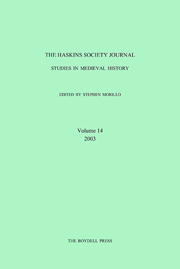Book contents
- Frontmatter
- Contents
- List of Illustrations
- Editorial Note
- Abbreviations
- 1 Even the Devil (Sometimes) has Feelings: Emotional Communities in the Early Middle Ages
- 2 Alcuin, Willibrord, and the Cultivation of Faith
- 3 Henry Loyn Memorial Lecture: English Identity from Bede to the Millennium
- 4 The ‘Farm of One Night’ and the Organisation of Royal Estates in Late Anglo-Saxon Wessex
- 5 Changing Fortunes: Edwardian Anglo-Jewry and their Credit Operations in Late Thirteenth-Century England
- 6 Forty Acres and a Mule: the Mechanics of English Settlement in Northeast Wales after the Edwardian Conquest
- 7 Consanguinity and the Saint-Aubin Genealogies
- 8 Widows, Religious Patronage and Family Identity: Some Cases from Twelfth-Century Yorkshire
- 9 Desecration and Consecration in Norman Capua, 1062–1122: Contesting Sacred Space during the Gregorian Reforms
- 10 From Ego to Imago: Mediation and Agency in Medieval France (1000–1250)
2 - Alcuin, Willibrord, and the Cultivation of Faith
Published online by Cambridge University Press: 05 September 2014
- Frontmatter
- Contents
- List of Illustrations
- Editorial Note
- Abbreviations
- 1 Even the Devil (Sometimes) has Feelings: Emotional Communities in the Early Middle Ages
- 2 Alcuin, Willibrord, and the Cultivation of Faith
- 3 Henry Loyn Memorial Lecture: English Identity from Bede to the Millennium
- 4 The ‘Farm of One Night’ and the Organisation of Royal Estates in Late Anglo-Saxon Wessex
- 5 Changing Fortunes: Edwardian Anglo-Jewry and their Credit Operations in Late Thirteenth-Century England
- 6 Forty Acres and a Mule: the Mechanics of English Settlement in Northeast Wales after the Edwardian Conquest
- 7 Consanguinity and the Saint-Aubin Genealogies
- 8 Widows, Religious Patronage and Family Identity: Some Cases from Twelfth-Century Yorkshire
- 9 Desecration and Consecration in Norman Capua, 1062–1122: Contesting Sacred Space during the Gregorian Reforms
- 10 From Ego to Imago: Mediation and Agency in Medieval France (1000–1250)
Summary
Sed ex parte desunt mihi, servulo vestro, exquisitiores eruditionis scolasticae libelli, quos habui in patria per bonam et devotissimam magistri mei industriam vel etiam mei ipsius qualemcumque sudorem. Idem haec vestrae excellentiae dico … ut aliquos es pueris nostris remittam, qui excipiant inde nobis necessaria quaeque et revahant in Frantiam flores Britanniae, ut non sit tantummodo in Euborica hortus conclusus, sed in Turonica emmisiones paradisi cum pomorum fructibus, ut veniens Auster perflaret hortos Ligeri fluminis et fluant aromata illius, et novissime fiat quod sequitur in cantico, unde hoc adsumpsi paradigma: ‘Veniat dilectus meus in hortum suum, et comedat fructum pomorum suorum’; et dicat adulescentis suis: ‘Comedite, amici mei, bibite et inebriamini carissimi. Ego dormio, et cor meum vigilat’, vel illud exhortativum ad sapientiam discendam Esiae prophetae elogium: ‘Omnes sitientes venite ad aquas. Et qui non habetis argentum, properate emite et comedite; venite, emite absque argento et absque ulla commutatione vinum et lac.’
In a frequently cited passage from a letter written to Charlemagne in 796/7, Alcuin, in semi-retirement as the abbot of St Martin's at Tours, describes, in the context of a request for his monarch's support in the enlargement of the monastic library, his commitment to the improvement of the standard of monastic education at St Martin's in Tours.
- Type
- Chapter
- Information
- The Haskins Society Journal 142003. Studies in Medieval History, pp. 15 - 32Publisher: Boydell & BrewerPrint publication year: 2005



